Remarks of Senator John F. Kennedy on Indochina before the Senate, Washington, D.C., April 6, 1954
Mr. President, the time has come for the American people to be told the blunt truth about Indochina.
I am reluctant to make any statement which may be misinterpreted as unappreciative of the gallant French struggle at Dien Bien Phu and elsewhere; or as partisan criticism of our Secretary of State just prior to his participation in the delicate deliberations in Geneva. Nor, as one who is not a member of those committees of the Congress which have been briefed – if not consulted – on this matter, do I wish to appear impetuous or an alarmist in my evaluation of the situation. But the speeches of President Eisenhower, Secretary Dulles, and others have left too much unsaid, in my opinion – and what has been left unsaid is the heart of the problem that should concern every citizen. For if the American people are, for the fourth time in this century, to travel the long and tortuous road of war – particularly a war which we now realize would threaten the survival of civilization – then I believe we have a right – a right which we should have hitherto exercised – to inquire in detail into the nature of the struggle in which we may become engaged, and the alternative to such struggle. Without such clarification the general support and success of our policy is endangered.
Inasmuch as Secretary Dulles has rejected, with finality, any suggestion of bargaining on Indochina in exchange for recognition of Red China, those discussions in Geneva which concern that war may center around two basic alternatives:
The first is a negotiated peace, based either upon partition of the area between the forces of the Viet Minh and the French Union, possibly along the 16th parallel; or based upon a coalition government in which Ho Chi Minh is represented. Despite any wishful thinking to the contrary, it should be apparent that the popularity and prevalence of Ho Chi Minh and his following throughout Indochina would cause either partition or a coalition government to result in eventual domination by the Communists.
The second alternative is for the United States to persuade the French to continue their valiant and costly struggle; an alternative which, considering the current state of opinion in France, will be adopted only if the United States pledges increasing support. Secretary Dulles’ statement that the “imposition in southeast Asia of the political system of Communist Russia and its Chinese Communist ally…should be met by united action” indicates that it is our policy to give such support; that we will, as observed by the New York Times last Wednesday, “fight if necessary to keep southeast Asia out of their hands”; and that we hope to win the support of the free countries of Asia for united action against communism in Indochina, in spite of the fact that such nations have pursued since the war’s inception a policy of cold neutrality.
I think it is important that the Senate and the American people demonstrate their endorsement of Mr. Dulles’ objectives, despite our difficulty in ascertaining the full significance of its key phrases.
Certainly, I, for one, favor a policy of a “united action” by many nations whenever necessary to achieve a military and political victory for the free world in that area, realizing full well that it may eventually require some commitment of our manpower.
But to pour money, materiel, and men into the jungles of Indochina without at least a remote prospect of victory would be dangerously futile and self-destructive. Of course, all discussion of “united action” assumes that inevitability of such victory; but such assumptions are not unlike similar predictions of confidence which have lulled the American people for many years and which, if continued, would present an improper basis for determining the extent of American participation.
Permit me to review briefly some of the statements concerning the progress of the war in that area, and it will be understood why I say that either we have not frankly and fully faced the seriousness of the military situation, or our intelligence estimates and those of the French have been woefully defective.
JFK Opposed Vietnam War
In February of 1951, for example, the late Brig. Gen. Francis G. Brink, then head of the United States Military Advisory Group, in Indochina, told us of the favorable turn of events in that area as a result of new tactics designed by Gen. Jean de Lattre de Tassigny. In the fall of that same year, General De Lattre himself voiced optimism in his speech before the National Press Club here in Washington; and predicted victory, under certain conditions, in 18 months to 2 years, during his visit to France.
In June of 1952, American and French officials issued a joint communique in Washington expressing the two countries’ joint determination to bring the battle to a successful end; and Secretary of State Acheson stated at his press conference that:
“The military situation appears to be developing favorably. … Aggression has been checked and recent indications warrant the view that the tide is now moving in our favor. … We can anticipate continued favorable developments.”
In March 1953, the French officials again came to Washington, again issued statements predicting victory in Indochina, and again joined with the United States in a communique planning military action and United States support which would achieve their new goal of decisive military victory in 2 years.
In May of 1953, President Eisenhower and Secretary of State Dulles told the Congress that our mutual security program for France and Indochina would help “reduce this Communist pressure to manageable proportions.” In June an American military mission headed by General O’Daniel was sent to discuss with General Navarre in Indochina the manner in which United States aid “may best contribute to the advancement of the objective of defeating the Communist forces there”; and in the fall of last year General O’Daniel stated that he was “confident that the French-trained Vietnam Army when fully organized would prevail over the rebels.”
In September of 1953, French and American officials again conferred, and, in announcing a new program of extensive American aid, again issued a joint communique restating the objective of “an early and victorious conclusion.”
On December 2, 1953, Assistant Secretary of State for Far Eastern Affairs Walter S. Robertson told the Women’s National Republican Club in New York – in words almost identical with those of Secretary of State Acheson 18 months earlier – that “In Indochina…we believe the tide now is turning.” Later the same month Secretary of State Dulles state that military setbacks in the area had been exaggerated; and that he did not “believe that anything that has happened upsets appreciably the timetable of General Navarre’s plan,” which anticipated decisive military results by about March 1955.
In February of this year, Defense Secretary Wilson said that a French victory was “both possible and probable” and that the war was going “fully as well as we expected it to at this stage. I see no reason to think Indochina would be another Korea.” Also in February of this year, Under Secretary of State Smith stated that:
“The military situation in Indochina is favorable. … Contrary to some reports, the recent advances made by the Viet Minh are largely “real estate” operations. … Tactically, the French position is solid and the officers in the field seem confident of their ability to deal with the situation.”
Less than 2 weeks ago, Admiral Radford, Chairman of the Joints Chief of Staff, stated that “the French are going to win.” And finally, in a press conference some days prior to his speech to the Overseas Press Club in New York, Secretary of State Dulles stated that he did not “expect that there is going to be a Communist victory in Indochina”; that “in terms of Communist domination of Indochina, I do not accept that as a probability”; that “we have seen no reason to abandon the so-called Navarre plan,” which meant decisive results only 1 year hence; and that the United States would provide whatever additional equipment was needed for victory over the Viet Minh; with the upper hand probably to be gained “by the end of the next fighting season.”
Despite this series of optimistic reports about eventual victory, every Member of the Senate knows that such victory today appears to be desperately remote, to say the least, despite tremendous amounts of economic and material aid from the United States, and despite a deplorable loss of French Union manpower. The call for either negotiations or additional participation by other nations underscores the remoteness of such a final victory today, regardless of the outcome at Dien Bien Phu. It is, of course, for these reasons that many French are reluctant to continue the struggle without greater assistance; for to record the sapping effect which time and the enemy have had on their will and strength in that area is not to disparage their valor. If “united action” can achieve the necessary victory over the forces of communism, and thus preserve the security and freedom of all southeast Asia, then such united action is clearly called for. But if, on the other hand, the increase in our aid and the utilization of our troops would only result in further statements of confidence without ultimate victory over aggression, then now is the time when we must evaluate the conditions under which that pledge is made.
JFK Opposed Vietnam War
I am frankly of the belief that no amount of American military assistance in Indochina can conquer an enemy which is everywhere and at the same time nowhere, “an enemy of the people” which has the sympathy and covert support of the people. As succinctly stated by the report of the Judd Subcommittee of the House Foreign Affairs Committee in January of this year:
“Until political independence has been achieved, an effective fighting force from the associated states cannot be expected. … The apathy of the local population to the menace of the Viet Minh communism disguised as nationalism is the most discouraging aspect of the situation. That can only be overcome through the grant of complete independence to each of the associated states. Only for such a cause as their own freedom will people make the heroic effort necessary to win this kind of struggle.”
This is an analysis which is shared, if in some instances grudgingly, by most American observers. Moreover, without political independence for the associated states, the other Asiatic nations have made it clear that they regard this as a war of colonialism; and the “united action” which is said to be so desperately needed for victory in that area is likely to end up as unilateral action by our own country. Such intervention, without participation by the armed forces of the other nations of Asia, without the support of the great masses of the peoples of the associated states, with increasing reluctance and discouragement on the part of the French – and, I might add, with hordes of Chinese Communist troops poised just across the border in anticipation of our unilateral entry into their kind of battleground – such intervention, Mr. President, would be virtually impossible in the type of military situation which prevails in Indochina.
This is not a new point, of course. In November of 1951, I reported upon my return from the Far East as follows:
“In Indochina we have allied ourselves to the desperate effort of a French regime to hang on to the remnants of empire. There is no broad, general support of the native Vietnam Government among the people of that area. To check the southern drive of communism makes sense but not only through reliance on the force of arms. The task is rather to build strong native non-Communist sentiment within these areas and rely on that as a spearhead of defense rather than upon the legions of General de Lattre. To do this apart from and in defiance of innately nationalistic aims spells foredoomed failure.”
In June of last year, I sought an amendment to the Mutual Security Act which would have provided for the distribution of American aid, to the extent feasible, in such a way as to encourage the freedom and independence desired by the people of the Associated States. My amendment was soundly defeated on the grounds that we should not pressure France into taking action on this delicate situation; and that the new French Government could be expected to make “a decision which would obviate the necessity of this kind of amendment or resolution.” The distinguished majority leader [Mr. Knowland] assured us that “We will all work, in conjunction with our great ally, France, toward the freedom of the people of those states.”
It is true that only 2 days later on July 3 the French Government issued a statement agreeing that:
“There is every reason to complete the independence of sovereignty of the Associated States of Indochina by insuring … the transfer of the powers … retained in the interests of the States themselves, because of the perilous circumstances resulting from the state of war.”
In order to implement this agreement, Bao Dai arrived in Paris on August 27 calling for “complete independence for Vietnam.”
I do not wish to weary the Senate with a long recital of the proceedings of the negotiations, except to say that as of today they have brought no important change in the treaty relationships between Vietnam and the French Republic. Today the talks appear to be at an impasse; and the return from Paris to Saigon of the Premier of Vietnam, Prince Buu Loc, is not a happy augury for their success. Thus the degree of control which the French retain in the area is approximately the same as I outlined last year:
Politically, French control was and is extensive and paramount. There is no popular assembly in Vietnam which represents the will of the people that can ratify the treaty relationship between Vietnam and the French. Although the Associated States are said to be “independent within the French Union,” the French always have a permanent control in the high council and in the Assembly of the Union and the Government of France guides its actions. Under article 62 of the French Constitution, the French Government “coordinates” all of the resources of the members of the Union placed in common to guarantee its defense, under policies directed and prepared by the French Government. French Union subjects are given special legal exemptions, including the privilege of extraterritoriality. The French High Commissioner continues to exercise powers with respect to the internal security of the Associated States, and will have a similar mission even after the restoration of peace. When Vietnamese taxes affect French Union subjects, there must be consultation with the representatives of the countries concerned before they are imposed. The foreign policy of Vietnam must be coordinated with that of France, and the French must give consent to the sending of diplomatic missions to foreign countries. Inasmuch as the French did not develop experienced governmental administrators before World War II, they have guided to some degree actions within the local governments by requiring the Vietnamese Government to turn to them for foreign counselors and technicians.
Militarily, French control is nearly complete. The United States has in the past dealt primarily with the French military authority, and these in turn deal with the Associated States. Our equipment and aid is turned over to the French who will then arrange for its distribution according to their decision. The French are granted for a period of time without limit facilities for bases and garrisons.
Culturally, the French are directly in contact with the training of intellectual youths of Vietnam, inasmuch as France joined in the establishment of the university, installed a French rector, and provided that all instructions should be in French.
Economically, French control of the country’s basic resources, transportation, trade, and economic life in general is extensive. In Vietnam, estimated French control is nearly 100 percent in the field of foreign commerce, international and coastal shipping, and rubber and other export products. The French control 66 percent of the rice export trade. Moreover, possession of property belonging to the French cannot be changed without permission of the French; and France shares the veto right under the PAU agreement on matters affecting France’s export and import trade.
All of this flies in the face of repeated assurances to the American people by our own officials that complete independence has been or will be granted.
In February of 1951, for example, the American Minister to the Associated States, Donald Heath, told us that the French colonial regime had ended and that “all Indochinese Government services were turned over to the Indochinese States.” This is untrue. In November of 1951, Assistant Secretary of State Dean Rusk again assured us that:
“The peoples of the Associated States are free to assume the extensive responsibility for their own affairs that has been accorded them by treaties with France.”
Last year, the Department of States assured me that:
“France had granted such a full measure of control to the 3 states over their own affairs that … these 3 countries became sovereign states.”
In February of this year, Under Secretary of State Smith stated that the representatives of the Governments of Vietnam and of France would “meet in Paris to draw up the treaty which will complete Vietnamese independence.” As I have said, those conversations began in July, and broke off 10 days ago. And again Secretary Dulles stated last week that:
“Their independence is not yet complete, but the French Government last July declared its intention to complete that independence, and negotiations to consummate that pledge are underway.” –They are underway 9 months after the pledge was originally given.
JFK Opposed Vietnam War
I do not believe that the importance of the current breakdown of these negotiations has been made clear to the Senate or the people of the United States. Every year we are given three sets of assurances: First, that the independence of the Associated States is now complete; second, that the independence of the Associated States will soon be completed under steps “now” being undertaken; and, third, that military victory for the French Union forces in Indochina is assured, or is just around the corner, or lies 2 years off. But the stringent limitations upon the status of the Associated States as sovereign states remain; and the fact that military victory has not yet been achieved is largely the result of these limitations. Repeated failure of these prophecies has, however, in no way diminished the frequency of their reiteration, and they have caused this Nation to delay definitive action until now the opportunity for any desirable solution may well be past.
It is time, therefore, for us to face the stark reality of the difficult situation before us without the false hopes which predictions of military victory and assurances of complete independence have given us in the past. The hard truth of the matter is, first, that without the wholehearted support of the peoples of the Associated States, without a reliable and crusading native army with a dependable officer corps, a military victory, even with American support, in that area is difficult if not impossible, of achievement; and, second, that the support of the people of that area cannot be obtained without a change in the contractual relationships which presently exist between the Associated States and the French Union.
Instead of approaching a solution to this problem, as Secretary Dulles indicated, French and Vietnamese officials appear to be receding from it. The Vietnamese, whose own representatives lack full popular support, because of a lack of popular assembly in that country, recognizing that French opinion favoring a military withdrawal would become overwhelming if all ties were entirely broken, have sought 2 treaties: one giving the Vietnamese complete and genuine independence, and the other maintaining a tie with the French Union on the basis of equality, as in the British Commonwealth. But 9 months of negotiations have failed thus far to provide a formula for both independence and union which is acceptable to the parties currently in the government of each nation. The French Assembly on March 9 – and I believe this action did not receive the attention it deserved – substantially lessened the chances of such a solution, through the adoption of a tremendously far-reaching rider which declared that France would consider her obligations toward Indochinese states ended if they should revoke the clauses in the French Constitution that bind them to the French Union. In other words, Mr. President, the French Parliament indicated that France would no longer have any obligations toward the Associated States if the present ties which bind them to the French Union – ties which assure, because of the constitutional arrangement of the French Union, that the French Republic and its Government are always the dominant power in the union – were broken.
I realize that Secretary Dulles cannot force the French to adopt any course of action to which they are opposed; nor am I unaware of the likelihood of a French military withdrawal from Indochina, once its political and economic stake in that area is gone. But we must realize that the difficulties in the military situation which would result from a French withdrawal would not be greatly different from the difficulties which would prevail after the intervention of American troops without the support of the Indochinese or the other nations of Asia. The situation might be compared to what the situation would have been in Korea, if the Japanese had maintained possession of Korea, if a Communist group of Koreans were carrying on a war there with Japan – which had dominated that area for more than a century – and if we then went to the assistance of the Japanese, and put down the revolution of the native Koreans, even though they were Communists, and even though in taking that action we could not have the support of the non-Communist elements of country.
That is the type of situation, whether we like it or not, which is presented today in connection with our support of the French in Indochina, without the support of the native peoples of Indochina.
In Indochina, as in Korea, the battle against communism should be a battle, not for economic or political gain, but for the security of the free world, and for the values and institutions which are held dear in France and throughout the non-Communist world, as well as in the United States. It seems to me, therefore, that the dilemma which confronts us is not a hopeless one; that a victorious fight can be maintained by the French, with the support of this Nation and many other nations – and most important of all, the support of the Vietnamese and other peoples of the Associated States – once it is recognized that the defense of southeast Asia and the repelling of Communist aggression are the objectives of such a struggle, and not the maintenance of political relationships founded upon ancient colonialism. In such a struggle, the United States and other nations may properly be called upon to play their fullest part.
If, however, this is not to be the nature of the war; if the French persist in their refusal to grant the legitimate independence and freedom desired by the peoples of the Associated States; and if those peoples and the other peoples of Asia remain aloof from the conflict, as they have in the past, then it is my hope that Secretary Dulles, before pledging our assistance at Geneva, will recognize the futility of channeling American men and machines into that hopeless internecine struggle.
The facts and alternatives before us are unpleasant, Mr. President. But in a nation such as ours, it is only through the fullest and frankest appreciation of such facts and alternatives that any foreign policy can be effectively maintained. In an era of supersonic attack and atomic retaliation, extended public debate and education are of no avail, once such a policy must be implemented. The time to study, to doubt, to review, and revise is now, for upon our decisions now may well rest the peace and security of the world, and, indeed, the very continued existence of mankind. And if we cannot entrust this decision to the people, then, as Thomas Jefferson once said:
“If we think them not enlightened enough to exercise their control with a wholesome discretion, the remedy is not to take it from them but to inform their discretion by education.”
—————————————————
As we can see from his speech to the Senate, JFK opposed Vietnam war long before he was president. Also check out my Black Op Radio interview regarding JFK’s Vietnam withdrawal policy or read more here.
Topic: JFK Opposed Vietnam War
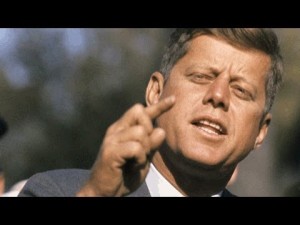
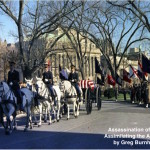
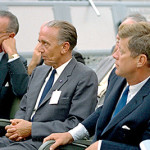

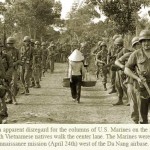

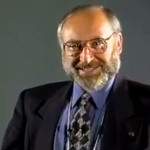
wow again thanks proving he was devastatingly more capable as still is 50 plus years on, thanks GB no not george bush
Quite so simply all the war dead then and since are on soulless warrior god-killers attending church
Wisdom and Foresight.
Now Missing in Congress Critters it seems.
From: david t. krall
email: truthatlarge@hotmail.com
Great speech by JFK. Very prescient. Could be said today, only he would have figured out the ISIS/Saudi-Sunni/CIA connection…another “counterfeit” cadre or militia…I’ll bet that speech and similar addresses gave notice of him in “certain” quarters, even in 1954. It appears he had to “temper” those views as he moved closer to his presidential candidacy and WH occupancy, to get the “blessing & support”, even in a minimal fashion, in some “face-saving” manner, especially after his nomination, and NO DOUBT (!) after his election as President. Both which were surprises to both LBJ and Nixon supporters, sponsors, friends and associates…things only got worse in the WH, when he used common sense, questioned the how and why of many policies and named his brother as an “extension” of his own eyes and ears, as Attn Gen. and unofficial “monitor” of CIA ops. (or tried. vs the CIA “Clique). That quote on your website, or something very similar to it, referring to “Forgive you enemies, just don’t forget their names” I believe was used by Julius Caesar…either in the film “Cleopatra” or mentioned in one of the recent books ( Michael Parenti and Barry Strauss) on the Assassination of Julius Caesar, which are part of my research library. I just joined / registered with your website. Researching since 1973. A most interesting and very important subject!!!
Regards,
David T. Krall
David,
Thanks for the feedback. So often we hear the claim that: “Because he was assassinated, we will never know what JFK’s true opinion about Vietnam was. Therefore, we can’t know what potential actions he would have taken with regards to Vietnam.” Those who make this type of claim have either not studied the official record within the context of the political climate of the day or already have their minds made up. JFK made his position clear from the time he was a member of the House and again as a Senator. Then, as President, he signed the order to withdraw all US personnel by the end of 1965, NSAM 263. The only area of equivocation comes from press interviews. These are “political minefields” and, as such, he could not allow himself to be painted as “soft on communism” just before an election year. However, he was unequivocal as to his intent to withdraw from Vietnam in his official capacity as POTUS.
From: david t. krall
email: truthatlarge@hotmail.com
Thanks for your reply ! Yes! I am n TOTAL agreement with your response…
He saw what Korea did to Truman…and how it “zapped” and consequently consumed his (Truman’s) administration…and played a major factor in his decision NOT to run again in 1952. Just like with LBJ in 1968…but LBJ was so corrupt and corrupted by his cronies, sponsors and allies who literally needed and wanted him in the WH, AT ALL COST before the end of the year, if not by Thanksgiving of 1963. I’m am sure that these traitors as well as their other “friends” within The DoD, CIA, FBI felt “very thankful” on Thanksgiving of 1963. JFK was removed and simultaneously RFK became a “lame- duck AG”. Anybody who is short-sighted enough to feel that, “Oh if there was a conspiracy…or one THAT big, RFK would gave done and said something.”. RFK as AG under JFK, was a different reality than under LBJ, when you consider ALL the components: bond of being JFK’s brother–an extremely CLOSE bond, familiarity and understanding, totally different temperment, views vs LBJ, and JFK/RFK were WH rivals to power of LBJ. LBJ and RFK hated each other, and privately LBJ never really had much respect for JFK, as best exemplified by an early “memorandum” from LBJ to JFK showing and “requesting” him being almost a co-president and what agencies he (LBJ) should run and administer.
J.E. Hoover was a LBJ ally and friend, who also hated JFK & RFK..
JFK not only trying to find a way “out” of Vietnam, the key was to resist pressures, maneuvers and “tricks” to force him to escalate, there-by not becoming “beholden” to these pro-escalation sectors. Just like in the Caribbean area with Castro and Cuba,,,There’s only one reason that RFK kept “quiet”…because he realized the horrific
implications, intent and “force”… and level, width and “breadth” of what happened on 11/22/63, and he would have “to bide his time”…he knew he was now a target and had to pick his moves carefully…just like LBJ under JFK (bidding his time???) after 11/22/63…now RFK was the one who now had to be LITERALLY careful…and we know what did happen in June of 1968…which confirms this view, at least in my opinion…It was some type of quasi or pseudo Coup…a quick, well planned ‘surgical” usurpation with as few overt complications as possible. Well planned and thought out, as if doing what was needed “to be done” in another…foreign nation…no different.
Regards,
david t. krall
Regards,
david t. krall